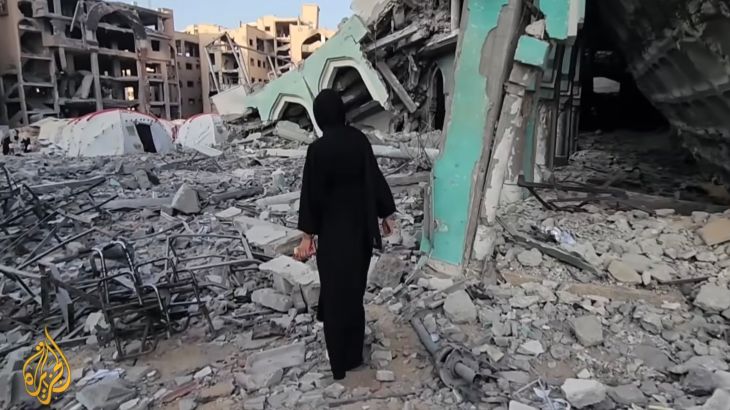Gaza’s medical students help health system decimated by Israel’s war
The United Nations says Israel has deliberately been targeting Gaza’s health facilities and killing medical personnel during the war.

Medical students tested by war: Students step in amid shortages in health sector
Published On 15 Nov 202515 Nov 2025
Save
Israel’s more than two-year genocidal war has shattered Gaza‘s health system, as hospitals and the medical personnel who tend to the thousands of wounded patients inside them continue to be targeted by Israeli attacks.
According to Gaza’s Health Ministry, more than 1,700 healthcare workers – including doctors, nurses and paramedics – have been killed since Israel’s war on Gaza began. The United Nations has accused Israel of deliberately targeting Gaza’s health facilities and killing medical personnel to destroy the besieged enclave’s healthcare system.
Recommended Stories
list of 3 itemsend of list
Israel continues to block essential medical supplies and equipment despite the month-old ceasefire agreement.
Supporting Gaza’s decimated health system, medical students have become front-line healers, performing lifesaving work even before they have earned their degrees.
They are filling the void left by the many doctors who have been killed, and by others left exhausted from round-the-clock shifts to treat the many wounded under severely dangerous and resource-depleted conditions.
“The war in Gaza has rewritten the rules of learning, of healing, and of growing up”, including for “Eman Eyad, a medical student who became a doctor in the heart of a war zone,” said Al Jazeera’s Tareq Abu Azzoum, reporting from Deir el-Balah, in central Gaza.
Eyad had been completing her medical studies at the Islamic University – until Israel destroyed and bombed it on October 10, 2023.
“But even without walls and without books, Eyad’s education continued,” said Abu Azzoum.

“I get more experience, I can deal with 10 patients in one day, or more. I go to the surgery and I am second surgeon, so that’s something exciting for me,” Eyad told Al Jazeera. “The war makes me more powerful, more experienced.”
Advertisement
Eyad has been working as a doctor at al-Shifa Hospital, Gaza’s largest hospital.
Israeli forces laid siege to the facility in mid-November 2023, claiming without any concrete evidence that it contained a command-and-control centre operated by the Palestinian group Hamas. That devastation and destruction was followed by a second major raid on the hospital in March 2024.
Hamas and hospital administrators denied the claims about the control centre, with human rights groups, including Amnesty International, saying that the evidence Israel provided to back up this claim was inconclusive.
“With senior doctors killed, displaced, or exhausted beyond measure, young students like Eyad stood to defend against the relentless tide of death,” said Abu Azzoum.

“We had a new generation of doctors who are already working now as colleagues, helping us, treating our patients, with overwhelming hospitals, overwhelmed staff here,” Hani al-Faleet, a senior paediatrician training medical students at al-Shifa Hospital, told Al Jazeera.
‘The most difficult moment of my life’
Gaza’s medical personnel remain committed to their work, even amid personal tragedy.
“I remained at my post until they asked me to evacuate,” Islam Abu Assar, a nurse working at al-Shifa Hospital, told Al Jazeera. “But I did not evacuate when my family fled to the south [of Gaza].”
Abu Assar speaks of the shock and anguish she felt when her mother called her to tell her that her brother had died.
“I never expected that one day I would receive my brother as a martyr,” she said.
“It was the most difficult moment of my life … when they [the health and ambulance team] brought my brother.”
Despite this horrific news, Abu Assar continued her work, even sleeping at the hospital.
“I remained steadfast and kept working until my last breath,” she said. “I stayed inside the [al-Shifa Hospital] complex, providing care to the wounded and injured because of the shortage of medical personnel.”

